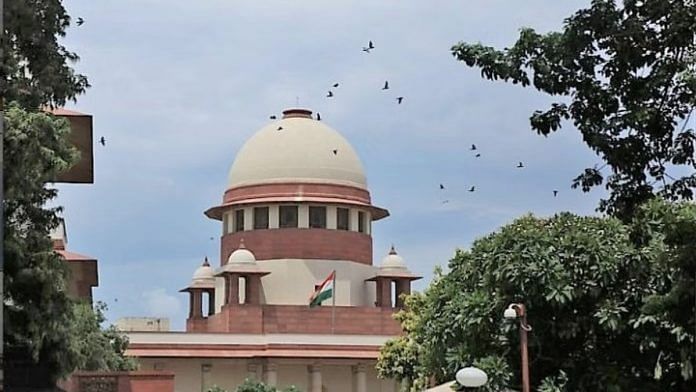
New Delhi: Ordering the liquidation of Jet Airways Thursday, the Supreme Court made crucial observations about the ineffective functioning of National Company Law Tribunals (NCLT) and National Company Law Appellate Tribunal (NCLAT), and highlighted the shortcomings of the Insolvency and Bankruptcy Code (IBC)—the law that governs the two quasi-judicial bodies established to resolve disputes arising out of company affairs. A three-judge bench, led by Chief Justice D.Y.
Chandrachud, took strong exception to the two bodies’ “growing tendency” to disregard the top court’s orders. Justice J.B.
Pardiwala and Manoj Mishra were the other two judges on the bench, with the former writing the judgment on behalf of all. Issuing a warning to the tribunal members against such a practice, the bench said: “Over a period of time, this Court has noticed the growing tendency amongst Members of the NCLT(s) and NCLAT to ignore the orders of this Court or act in its defiance. We put the NCLT(s) and the NCLAT to notice, that any act of contravention of this Court’s order and the larger rubric of judicial propriety will not be tolerated.
” The top court’s remarks about the tribunal’s non-adherence to its orders came as it overturned NCLAT’s decision to permit the successful resolution applicant (SRA) in the Jet Airways case to adjust a personal bank guarantee towards its payment obligations. This was done by NCLAT despite the Supreme Court’s explicit orders disallowing it. The bench invoked its extraordinary powers under Article 142 and directed the liquidation of cash-strapped Jet Airways, after observing that the SRA—Jalan Kalrock Consortium (JKC)—had failed to implement the approved resolution plan in a time-bound manner.
This slow implementation defeated the objective of IBC, which it said is meant to provide speedy disposal to insolvency proceedings that arises owing to default of loan repayment by a company. With its order, the court also set aside the NCLAT’s direction to transfer ownership of the airline to JKC, since it did not meet the obligations set out in the resolution process. The court’s order also spotlighted the lack of proper infrastructure in the two tribunals, increasing the number of vacancies in them and spoke out against political appointments of members, who preside over the two bodies.
Also Read: ‘This litigation is an eyeopener’: Why SC invoked Article 142 to order liquidation of Jet Airways Frowning upon political appointments in the tribunals, the bench said that “persons with high ideals, impeccable integrity” and “domain knowledge” should be chosen as members. It noted that those appointed to the tribunals often “lack the domain knowledge required to appreciate complexities involved in high-stake insolvency matters in order to take them to a logical conclusion”. The burgeoning vacancies and inadequate infrastructure in the two benches have significantly impacted the government’s insolvency reform initiatives as they lead to operational inefficiencies.
Moreover, the members do not have the practice of sitting for full working hours and “particularly lack in the capacity to manage the growing number of cases and giving undivided attention required in such matters”, the judgment said. This is because members sit for only a few days of the week or a few hours in a day. In the benches where there are no vacancies, the lack of requisite infrastructure has forced the members to share courtrooms or halls on a rotation basis.
Consequently, hearings in cases remain incomplete, resulting in failure to comply with the strict timelines underlined in the IBC to complete the resolution process. While asking the government to impose strict mandates regarding the functioning of tribunals and their working hours, apart from appointing experts with domain knowledge, the court called for the need to make new appointments in a manner that it coincides with the date of retirement of sitting members to prevent operational inefficiencies and adverse impact on the resolution process. Further, the CJI-led bench made sharp remarks against NCLTs and NCLAT for their failure to ensure that there are no delays in the resolution process, besides the timely admission and disposal of applications related to initiation of Corporate Insolvency Resolution Process (CIR), and approval of the resolution plan and liquidation.
“Adjudication in a time-bound manner would help prevent any further deterioration of the value of the corporate entity. The integrity of the original timelines laid down by the Code and the resolution plan must not be allowed to be violated since it would dilute the objective of the Code in its entirety, erode investor confidence and hinder all corporate restructuring efforts ,” the Court stated. This it said in the background of multiple extensions of deadline that were given to the SRA in the Jet Airways matter to fulfill the conditions as given under the resolution plan.
“One of the salutary objects of the Code, 2016 is to protect the assets of the corporate entity in timely manner and taken prompt decisions, however, it has become a practice of the NCLT(s) and NCLAT to ignore the urgent mentionings and listings of time-sensitive matters and show no deference to long-pending matters resulting in value erosion of the assets of the corporate debtor and rendering their insolvency resolution process a foregone conclusion,” the court said. Asking the tribunals to take their role seriously to resolve insolvency proceedings in a time-bound manner, the court said that the members must rethink their approach towards admission and disposal of these cases, instead of acting “as a mere rubber stamp authority”. (Edited by Mannat Chugh) Also Read: Jet Airways’ smooth takeoff, turbulence & crash landing.
Key events leading to SC-ordered liquidation var ytflag = 0;var myListener = function() {document.removeEventListener('mousemove', myListener, false);lazyloadmyframes();};document.addEventListener('mousemove', myListener, false);window.
addEventListener('scroll', function() {if (ytflag == 0) {lazyloadmyframes();ytflag = 1;}});function lazyloadmyframes() {var ytv = document.getElementsByClassName("klazyiframe");for (var i = 0; i < ytv.length; i++) {ytv[i].
src = ytv[i].getAttribute('data-src');}} Save my name, email, and website in this browser for the next time I comment. Δ document.
getElementById( "ak_js_1" ).setAttribute( "value", ( new Date() ).getTime() );.














